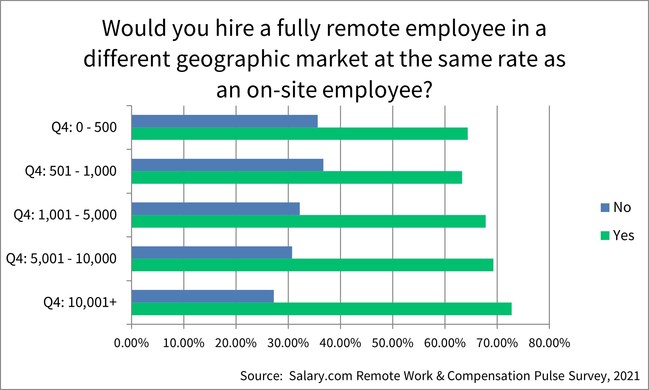Employees want to maintain the option to work remotely post-pandemic and will not tolerate being compensated less for remote work, according to new survey data from Salary.com. The Remote Work & Compensation Pulse Survey of both employees and employers, conducted in May 2021, found 48% percent of employees want to be fully remote and 44% want a hybrid work model. The hybrid work model has support among 51% of employers surveyed, though there is a big divide when it comes to fully remote work, with only 5% of employers saying that will be an option. Another red flag: 92% of employers have no formal practice in place for determining pay for partially remote employees; 72% have no formal practice in place for determining pay for fully remote employees.
Compensation Adjustments for Remote Employees
While generally there has been speculation that employers would decrease pay for fully remote employees going forward, the Salary.com data shows otherwise. An overwhelming majority (95%) of employers said they would not lower compensation for employees who continue, or transition to, working remotely. This is a critical point, given that 83% of employees said they would leave their job if compensated less for working remotely. A vast majority of employees (94%) believe they should be compensated based on their skill set, not their location.
The same strategy applies to partially remote employees, with 97% of employers indicating they will not lower an employee’s compensation if they continue, or transition to, working partially remote. For those that would adjust compensation, 21% would adjust salary with employee contribution, geographic location, and concerns about culture as contributing factors.
“Remote work translates into a more fluid, and potentially volatile, market for how employees move from company to company,” said David Cross, Senior Compensation Consultant for Salary.com. “This double-edged sword not only means that there’s a broader selection of talent from which to hire, but that there is also an increased retention risk to the current workforce. Employers recognize that rewards need to not only reflect and attract these skills into the business, but to retain those skills of their existing employees.”
Compensation Strategy Shifts for New Hires Working Remote
The compensation strategy appears to shift for new hires. When asked if they would hire a fully remote employee in a different geographic market at the same rate as an on-site employee, 34% of employers said No.
For their pay decisions they would take into account:
- Geographic differentials (58%)
- External competitiveness (67%)
- Cost of living (43%)
“One-quarter of employers indicated they will take different considerations into account when determining fully remote pay for new hires, which could create a subtle class divide between new hires and existing employees,” said Cross. “This move could have significant consequences on employee culture and retention.”
Return to Work Timetable of Employers
- 51% planning to bring employees back to the workplace in Q2
- Most prevalent in organizations with less than 500 employees
- 37% planning to make the shift in Q3
- Most prevalent with organizations with 5,000+ employees
- Remaining organizations are planning to make the shift in Q4
- Predominantly organizations with 1,000+ employees
Survey Methodology
Both the Employer and Employee surveys were conducted in May of 2021 by Salary.com. There were 743 employer responses from organizations across the US: 32% of respondents were HR professionals; compensation professionals accounted for an additional 17%; 64% of respondents were from organizations with 500 employees or less. A total of 549 individuals from across the US responded to the Employee survey: 36% of respondents identified as Individual Contributors; Middle Manager/Director accounted for an additional 26%. 54% of respondents were from organizations with 500 employees or less.
Image licensed by: Pixabay.com
Related News:
Survey Finds User Experience is IT’s Top Remote Work Challenge


